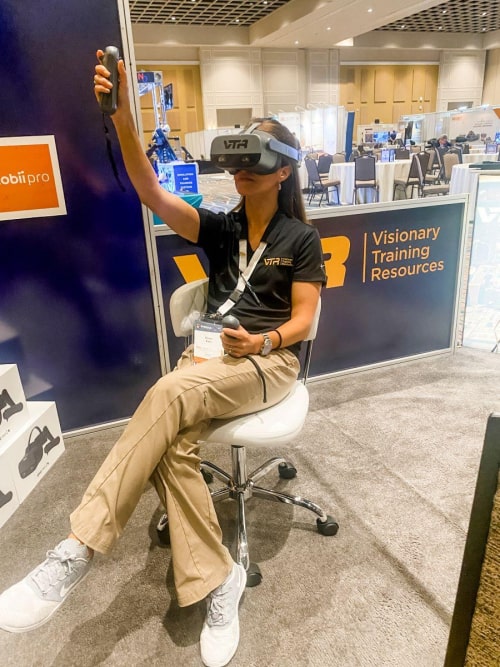Professional Pilot Dianna Klein demos VTR's FlightDeckToGo™ VR Headset at the 2021 World Aviation Training Symposium: Suggesting, for the first time, that some pilot training can be done at home, in fully immersible flight decks.
Throughout the years, industry leaders have been working to refine and optimize the effectiveness of the Commercial Airline pilot training footprint, without compromising on safety or reducing efficiency.
As the pilot shortage increases in severity and demand for pilots skyrockets, training departments are becoming increasingly concerned about the feasibility of efficiently moving high volumes of pilots through training at record levels: Something rarely attempted at this scale in most Airlines’ recorded history.
Among the new opportunities gaining attention is the possibility of completing (at least some) virtual pilot training in VR.
While the FAA does not currently recognize Virtual and Augmented Reality training as something which can replace simulator or flight time, it is beginning to appear more and more in various curriculum as an additional training tool and study aid.
The US Air Force, for example, has been using fully immersive, tethered Virtual Reality bays for several years to train various aircraft scenarios easily and safely, in their TrainingNEXT initiative. While on-campus, tethered VR has been around for some time, a new facet of at-home VR technology is emerging, indicating just how limitless the possibilities are.
The virtual reality flight deck, FlightDeckToGo™ from VTR debuted publicly last month, offering the very first in-home procedures and flows training of its kind. Everything the pilot needs to begin training is delivered to their door in a small package.
Evey Cormican, Virtual Training Resources’ founder and CEO, who is also a Major US Airline Captain with extensive training department experience explains:
“It’s important to note: FlightDeckToGoTM headsets are not meant to replace simulator time. They do not offer free play, and they do not make an attempt to simulate flying. What they do offer is the chance for a pilot to have unlimited access to their new flight deck while training flows and procedures in organized training modules. The result is a more standardized, simulator ready pilot, ready to learn on day one in the training center. In short, it augments already scheduled simulator training, and creates a better training experience for the pilots.”
While the early nature of the company’s platform makes it hard to predict the integration of VR into mainstream training, one thing is for certain: VR is here today and is almost certainly going to play a significant role in helping with upcoming pilot training pain points.
For more information on the untethered FlightDeckToGo™ and VTR’s mission to train pilot flows and procedures at home, visit www.vtrvr.com






